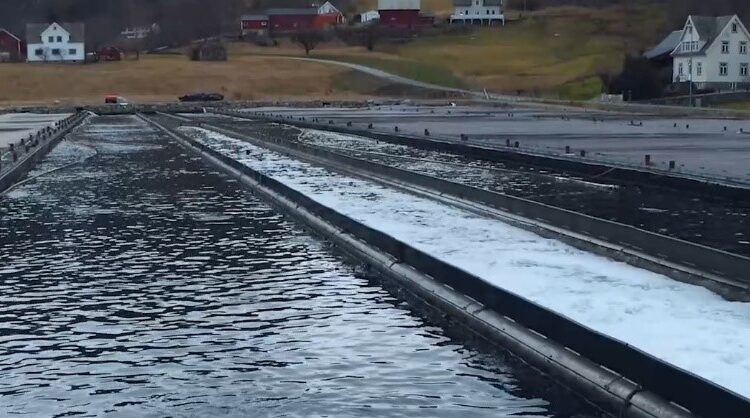Fish sludge has long been prized as a source of nutrient-rich fertilizer for agricultural uses. Turning it from aquacultural waste into a natural fertilizer is where Norway’s Blue Ocean Technology operates. It has been producing compact and energy-efficient systems specifically designed to handle and treat aquaculture sludge for domestic and international customers for the last five years.
Aquaculture – or fish farming – has become increasingly important as overfishing has been depleting our natural fish supplies. Annual aquaculture production is projected to grow by 32% by 20301. Traditionally dominated by Asia (89% of global aquaculture production by 2030), the sector is expanding rapidly in other geographies, as well, with growth in Africa and Latin America expected to reach 48% and 33% respectively. Norway’s aquaculture industry, renowned for its high-quality product, is also projected to grow by almost 20%.
And more fish means more fish sludge…
The circular economy of the food chain
In Norway’s case, fish farming is expected to become one of the main players in the country’s bioeconomy. Every year, approximately 27,000 tons of nitrogen and 9,000 tons of phosphorus end up in the sea in the form of fish sludge2.

The aquaculture industry has had a reputation for focusing primarily on maximizing production – even at the expense of the environment – but this is changing. Increasingly, it is embracing more sustainable and environment-friendly practices and ecologically sound technologies. These are values shared by both Schneider Electric and Blue Ocean Technology so it was a natural fit when the two companies began collaborating on the development of Blue Ocean’s sludge treatment facilities, with digital solutions to improve process control and monitoring.
“We have been following the development of Blue Ocean Technology’s business. Land-based fish farming – from hatcheries and post-smolt production to full-cycle land-based fish farms (and closed systems in the sea) – is an important business area for Schneider Electric,” says Allan Ødegård, Aquaculture Segment Manager at Schneider Electric.
“Blue Ocean Technology, through their Bluehouse systems® product range, delivers very compact systems and, like us, is concerned about reducing their environmental footprint and power consumption. This is in line with Schneider Electric’s mission and our focus on sustainability and efficiency in both industrial processes and energy management. We also think quite similarly about further development.”
An appetite for innovation
Schneider’s EcoStruxure Machine provided Blue Ocean Technology with the advanced digital solution they wanted to remotely control sludge management and treatment in the plant and on the feed barges. EcoStruxure Machine Advisor gives them the power to remotely monitor the drives and motors that manage the pumps, and EcoStruxure Secure Connect Advisor ensures a cybersecure plant.
The complete hardware and software solution for the automation and electrical systems was delivered by Blue Ocean Technology’s partner, BEKAS and the results of the more connected and digitized facilities speak for themselves:
- Increased profitability and sustainability thanks to 25% savings on maintenance, energy, and resources
- Better equipment control
- Confidence and peace of mind in a cybersecure plant
- Reduced downtime and OpEx using predictive maintenance
- Smaller environmental footprint than competitors
- Better informed decision-making on operations through intelligent remote control and meaningful analytics
“We are experiencing an increasing demand for our solutions,” notes Jan Henning Legreid, Blue Ocean Technology’s Head of Product Development and Sales. “We have already seen the impact of our partnership with Schneider Electric, which is enabling us to offer even better solutions. They include system development and an architecture for monitoring and control (EcoStruxure), which allows predictive maintenance based on machine learning and reporting modules for customers.”

Sustainability through digitization
Efficiency is the first step towards sustainability. For industries striving to become more sustainable, Schneider Electric’s digital solutions, like those used in Blue Ocean Technology’s systems, provide important, real data from the connected machines to measure and track the progress of a company’s sustainability commitments by facilitating more efficient processes, reducing water and energy usage, food loss, or waste.
To know more, please check Schneider Electric.

